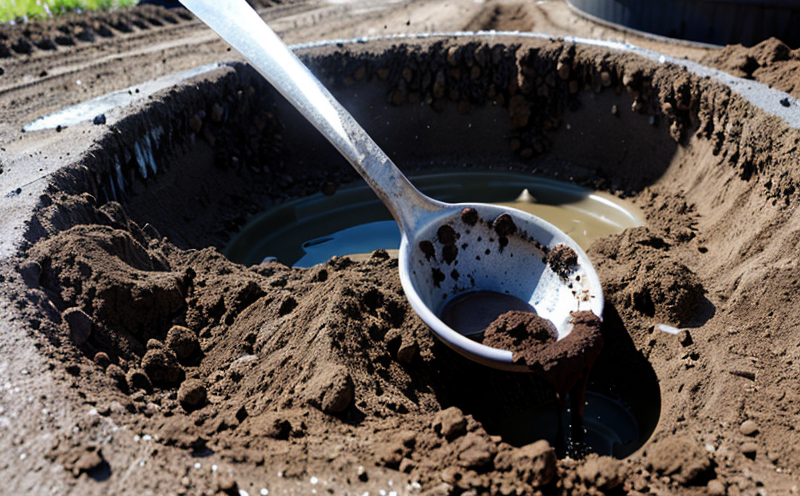EPA 8151 Chlorinated Herbicides in Sludge Test
The EPA Method 8151 is a critical analytical procedure used by regulatory authorities and environmental laboratories to determine the presence and concentration of chlorinated herbicides in sludge. This method is particularly important for compliance with U.S. Environmental Protection Agency (EPA) regulations aimed at ensuring that sewage sludge products are safe for agricultural use or beneficial reuse.
Chlorinated herbicides, such as 2,4-dichlorophenoxyacetic acid (2,4-D), aminochlorophenoxazine (APX), and mecoprop, among others, can be introduced into sludge during wastewater treatment processes. These chemicals are used to control unwanted plant growth in waterways and can persist in the environment if not properly managed. The EPA has established stringent limits on the allowable concentrations of these compounds in sewage sludge intended for agricultural reuse.
The methodology specified by EPA 8151 involves several steps, including sample preparation, extraction, clean-up, and analysis using gas chromatography with mass spectrometry (GC-MS). The test requires precise handling of the sludge samples to avoid contamination or loss of analytes. Proper sample preparation is crucial for obtaining accurate results.
The method's accuracy and precision are paramount in ensuring compliance with regulatory standards. Laboratories like Eurolab adhere strictly to EPA 8151 guidelines to ensure reliable data that can be used for decision-making processes related to sludge management. Compliance officers, quality managers, and R&D engineers often rely on such tests to monitor the safety of their products.
One key aspect of this test is the ability to detect chlorinated herbicides at very low concentrations, which adds to its significance in environmental monitoring. The detection limits are set by EPA regulations, ensuring that even trace amounts of these compounds can be identified and reported accurately. This capability is essential for maintaining public health and environmental protection standards.
The test results provide valuable information on the potential risks associated with the use of sludge products. By identifying and quantifying chlorinated herbicides, laboratories like Eurolab contribute to informed decision-making processes that ensure compliance with regulatory requirements. The data generated from this testing can influence policies related to agricultural practices and land application of biosolids.
Another important consideration is the potential for cross-contamination during sample handling. This risk is particularly high in sludge samples due to their complex nature, which makes accurate and precise sample preparation critical. Proper training and standard operating procedures are essential to minimize these risks.
The method's complexity also highlights the importance of using advanced analytical instruments such as GC-MS for reliable results. The use of these sophisticated technologies ensures that the test can accurately differentiate between similar compounds and provide a clear picture of the sludge composition.
Benefits
The EPA 8151 Chlorinated Herbicides in Sludge Test offers several benefits to laboratories, regulatory bodies, and industries involved in sludge management:
- Compliance with Regulations: Ensures that sludge products meet the strict standards set by the EPA for agricultural reuse.
- Risk Assessment: Provides critical data on the potential risks associated with using sludge, aiding in informed decision-making processes.
- Quality Assurance: Supports quality management systems by ensuring that sludge products are safe and meet specified safety standards.
- Informed Decision-Making: Helps in making evidence-based decisions regarding the beneficial use of sludge for agricultural purposes.
- Precision and Accuracy: Ensures reliable data through precise sample preparation and advanced analytical techniques, leading to accurate results.
- Public Health and Environmental Protection: Contributes to maintaining public health by ensuring that potentially harmful compounds are identified and managed appropriately.
The test is essential for industries dealing with wastewater treatment and biosolids management. By providing accurate and reliable data, it supports the safe reuse of sludge products, thereby promoting sustainable practices in agriculture and environmental protection.
Eurolab Advantages
At Eurolab, we pride ourselves on delivering high-quality results for EPA 8151 Chlorinated Herbicides in Sludge Test. Our advantages include:
- Expertise and Experience: Our team of highly skilled professionals has extensive experience in conducting this test according to EPA guidelines.
- State-of-the-Art Facilities: We operate state-of-the-art laboratories equipped with the latest analytical instrumentation, including GC-MS, ensuring precision and accuracy in our results.
- Precision Sample Preparation: Our rigorous sample preparation protocols minimize the risk of contamination and ensure accurate detection of chlorinated herbicides.
- Rigorous Quality Control: We implement strict quality control measures to maintain consistent and reliable test results.
- Comprehensive Reporting: Our reports are detailed, providing not only quantitative data but also qualitative insights that aid in informed decision-making processes.
- Customer Support: Our dedicated customer support team is always available to assist with any queries or concerns you may have regarding the test process or results.
By choosing Eurolab for your EPA 8151 Chlorinated Herbicides in Sludge Test, you can be confident that you are receiving accurate, reliable, and compliant results. Our commitment to quality and customer satisfaction ensures that you receive the best possible service.
Competitive Advantage and Market Impact
The EPA 8151 Chlorinated Herbicides in Sludge Test is a critical tool for regulatory compliance, risk assessment, and quality assurance. It plays a significant role in the competitive landscape of environmental testing by:
- Safeguarding Reputation: By ensuring that sludge products meet stringent EPA standards, laboratories like Eurolab safeguard their reputation as reliable partners in sustainable waste management.
- Enhancing Client Trust: Accurate and timely results build trust with clients, fostering long-term relationships based on reliability and expertise.
- Promoting Sustainable Practices: Compliance with EPA regulations promotes sustainable agricultural practices by ensuring that sludge products are safe for beneficial reuse.
- Innovation in Testing: Our continuous efforts to improve testing methods and instrumentation keep us at the forefront of environmental analysis, providing a competitive edge in the market.
The test's ability to detect trace amounts of chlorinated herbicides ensures that industries can confidently use sludge products for agricultural purposes, thereby reducing waste and promoting resource efficiency. This capability is particularly valuable in a market where sustainability and regulatory compliance are increasingly important.





